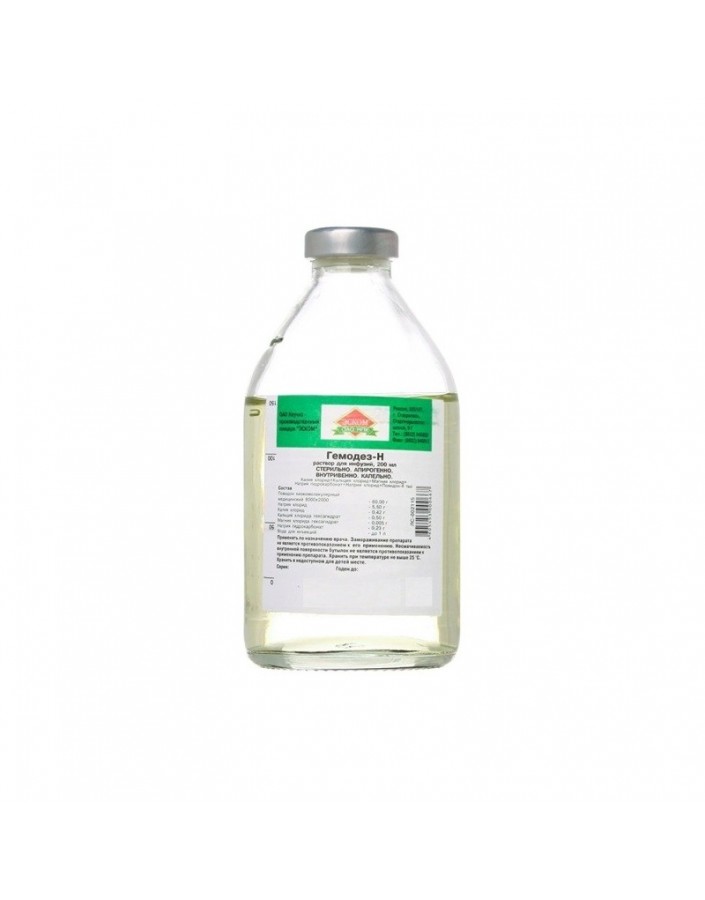



HEMODEZ SOLUTION FOR INFUSION 200ML

Security policy (edit with Customer reassurance module)

Delivery policy (edit with Customer reassurance module)

Return policy (edit with Customer reassurance module)
Mechanism of actionPolymeric low-molecular compound (average m. 12,600 - gemodez and krasgemodez), well soluble in water, binds toxins circulating in the blood and quickly removes them from the body. Most fully binds toxins circulating in the blood of patients with dysentery, salmonellosis, food intoxication. With a burn disease, different toxins are produced at different periods of the disease. Those of them that are formed in the first 4-5 days of the disease are quite completely inactivated; the toxins formed at a later date are neutralized much less. Toxins, which are formed in the body of patients with acute radiation sickness, do not bind, although it is possible to accelerate their elimination from the body. Enhances renal blood flow, increases glomerular filtration and diuresis. Contributes to the elimination of red blood cell stasis in the capillaries, which develops during intoxication of any origin, which leads to improved microcirculation. High colloid-osmotic activity of the drug causes the transition of the extracellular fluid into the bloodstream and contributes to the restoration of circulating blood volume. The use of a lower molecular weight polyvidone solution (average molecular weight of 8000 - gemodez-N and neogemodez) accelerates its excretion by the kidneys and improves the detoxification properties of the drug. The drug is non-toxic, does not possess antigenic and pyrogenic properties. Metabolic transformations in the body is not exposed. Quickly excreted by the kidneys. Indications and usageShock (traumatic, post-surgical, burns, hemorrhagic) intoxication (toxic gastrointestinal diseases: dysentery, dyspepsia, salmonellosis, burn, radiation and hemolytic disease, peritonitis, ileus, hyperthyroidism, hepatic disease, sepsis, pneumonia, acute myocardial infarction), toxemia newborns, pregnancy toxicosis. In / in drip (40-80 drops / min), through the system with a filter. The dose depends on the age of the patient and the severity of intoxication.Single dose for adults - 200-500 ml; for children - 5-10 ml / kg (maximum single dose for infants - 50-70 ml = 2.5 ml / kg, 2-5 years - 100 ml, 5-10 years - 150 ml, 10-15 years - 200 ml ). The drug is administered once or repeatedly (up to 2 times per day) for 1-10 days, depending on the severity of intoxication. In case of acute gastrointestinal infections, burn and radiation diseases, they are administered 1-2 times a day; with hemolytic disease and toxemia of newborns - 2-8 times a day (daily or every other day); with a large-focal myocardial infarction (1 day) - 200 ml once, with complications for 2 days - 200 ml. Adverse reactionsDecrease in blood pressure, tachycardia, difficulty breathing (with rapid administration), allergic reactions of varying severity (up to the development of anaphylactic shock). ContraindicationsHypersensitivity, heart failure IIB-III, acute nephritis, bronchial asthma, respiratory failure, hemorrhagic stroke, phlebothrombosis, thromboembolism, diabetes mellitus (for drugs containing dextrose), conditions after craniocerebral trauma, oliguria, anuria. Special notesWith extensive burns combined with the introduction of plasma, albumin, gamma globulin. Before starting the infusion, the doctor is obliged to check the tightness and integrity of the package. The drug must be transparent, not contain suspension and sediment. The results of the visual inspection are recorded in the patient’s medical history. Before the introduction of the solution is heated to body temperature. |